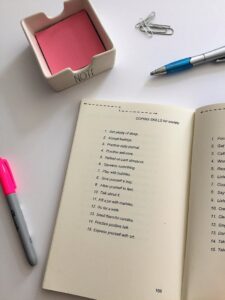Are you finding it difficult connecting with your partner?
Do you notice that at times you’ll hold in your thoughts and feelings versus sharing them with your partner?
Budling a healthy relationship includes the practice of awareness. Awareness comes into play when a person is able to understand that something is bothering them, and they engage in actions that allow a healthy release. Such as knowing that they are struggling with “X” and addressing if the person practices healthy communication or journal writing.
When a person practices a healthy level of awareness, they can utilize that very skill to improve connection in the relationship.
In essence, awareness is the practice of knowing what is taking place inside and out. The more connected you are to this skill, the better you’ll be in connecting to your partner on an emotional level.
A supportive tool that helps couples improve their relationship and overcome broken marriages or relationships is the couple’s journal. CLICK HERE to learn more about it. This is the perfect couples workbook and journal combination for couples that want to continue improving their relationship. The journal is filled with fun prompts, relationship strategies, inspirational topics, and educational exercises aimed to take your relationship to next level. The couples journal is a guide that supports you to strengthen your emotional connection, sustain commitment, learn about each other’s life goals and relationship passions. Together you can create a safe and constructive space geared to building your dream relationship.
How to know if you are not connecting with your partner:
- You do not feel that there is a safe environment when sharing thoughts and feelings.
- You are not communicating.
- You do not feel heard.
- You feel lonely.
- You feel that your needs (emotional, physical, spiritual, etc.) are not met.
- You feel more like roommates.
Below are ways to utilize awareness to improve your relationship.
If you are having a bad day.
Life happens and we get so busy that we can push our thoughts and feelings to the back burner which then leads them to spill out in behaviors such as that yelling or throwing an item. Building awareness centered on how you are feeling during the day helps to increase your understanding of how you are feeling in the moment.
Questions to ask yourself:
- How am I feeling?
- Am I carrying any tension?
- Have I practiced positive affirmations today?
- Have I practiced self-care today?
The above questions give you space to understand how you are feeling and strategies to improve your mood.
The goal is to gain an early understanding of how you are feeling so that you are able to improve your interaction and connection with your partner. Not doing so can lead to experiencing tension or overall negative interaction with your partner.
To support with affirmations, the practice below can be followed:
Ground yourself with supportive words.
The power of words is beyond measure. I’m sure that you have had an experience in which you gave yourself words of kindness or someone else gave you those words. During this moment, you probably felt uplifted. Empowered.
You can be your own healer.
Try using positive supportive words. Below are examples that you can play with:
- I am strong and beautiful.
- I can continue to move beyond this moment.
- Today has been a challenging day and for that, it is okay for me to stop and slow down.
If you notice that your partner isn’t doing well.
- What do you do if you notice that your partner is not doing well?
- Do you ignore them?
- Do you use statements like, “you look so grumpy”
The practice of self-awareness aims to help people identify how they are feeling and in addition those around them. I want you to think about the last time you were with your partner. Maybe at home or during a date.
Do remember staring at them trying to understand how they were feeling?
Typically, what takes place is that people focus more on their own thoughts and details pertinent to their day. For instance, if you get home after a rough day at work. You may walk around the house focused on your day. Thinking about the issues at work that took place. All while your partner is sitting struggling with their personal issues.
To build connection, one can practice includes utilizing cues before entering environments. Let’s take the above example so that you have clarity as you move forward in life from this reading.
Before arriving home, the person above sits in their car and reflects on the cues below:
- “Before I enter this home, how do I want to present myself?”
- “Am I carrying any tension or stress that can hurt my connection with my partner?”
The cues above are simple and easy to practice. They take only several minutes and can work to provide you with a healthy space of connection.
Learning what bothers you.
I like to think that just about everyone has at least one thing in life that bothers them. For some, it’s noises while for others can be changed. The change in moving to a new home or a new job. Typically, when couples struggle to share what bothers them problems take place. The problems appear for a simple reason.
The first is that when something bothers you, it’s likely for you to have a reaction. Such as tension from the thing that is bothering you. The tension that you feel is then potentially released on those close to you. Such as that of your partner.
The second is that when something bothers you and you don’t share it, it’s likely to create space. In this case, bad space. Relationships grow when people agree to come together in sharing their thoughts and feelings. This doesn’t mean that you have to share everything.
I want you to think about a time that you shared something that was bothering you. Did sharing it with your partner help you feel closer to them when you received a healthy listening ear? I assume yes. Now just so that we can address it. Sharing can go in the wrong direction when we are not provided with compassion. Such as that of being ignored when sharing information. In addition, to the above, take time to find a marriage counselor near you. Working with a marriage counselor can support in learning how to deal with frustration and challenges in life in a productive manner.
Learning what bothers you is very similar to taking the time to engage in one-on-one work. When was the last time that you slowed down? That you took time to work on your self-care and mental health? In the end. of the day, building a successful relationship is directly connected to those that build it. Use the exploration journal below to work on yourself. CLICK HERE to learn more about the exploration journal.
To improve your relationship, consider taking time at least once a week to explore the following:
- How you feel.
- What bothers you.
- How you navigate the things in life that bother you.
A supportive tool that aids people with awareness is the practice of yoga.
Benefits of practicing yoga include:
- Reduction in stress.
- Improvement in pain, such as back or neck pain.
- Understanding and managing pain.
- Ability to connect to a community. Such as joining a yoga club in your area or online as a way to connect with a supportive community.
- Improvement in circulation.
- Reduction in risk to injury.
- Improvement in muscle tone, strength, and flexibility.
Another area to consider when it comes to yoga is the practice of being present in the moment. If you think about therapy, much of the practice is connected to building focus on the conscious effort to be in the moment. When you are ready, try to practice yoga and when doing so take time to check in with your body. For instance, if you are doing a neck stretch ask yourself, “where am I carrying stress?”. This question can give you space to deeply look at your life and understand how your decisions, the things you do, and how you think directly impact your mind and body. For a supportive resource, check out Yoga With Adrienne on YouTube by clicking here.
Learning ways to support your partner.
Building awareness gives you the insight to understand how you want to receive support and how your partner desires to receive support. Typically, people provide support in the ways that they prefer to receive it. For instance, if you like to receive support with a comforting conversation. It is likely that you will provide others with the same conversation.
When you are with your partner take time to explore the following questions:
- How do you like to be supported?
- If you are upset how can I support, you?
- If I am tense, what can I do to support myself?
An additional area to focus on to improve connection in your relationship is that of counseling. Working with a marriage counselor or relationship therapist provides couples with skills to improve the relationship and strategies to address the challenges.
Practicing weekly deep conversations can support improving the connection. The practice promotes a sense of awareness due to the person having to allocate space
To engage in deep conversations.
Most couples often seek marriage counseling due to communication problems. Not hearing each other, struggling to understand each or just an overall difference that leads to conflict. Relationships are built on two core avenues verbal and nonverbal language. Below are questions to explore together aimed at helping you develop a deep emotional connection.
- If you were someone famous, who would it be?
- What would constitute a perfect day?
- What is your biggest fear?
- If you could have one superpower to help humanity what would it be?
- What have you accomplished in your life with the support of your partner?
- What is your most treasured memory?
- What do you value about relationships?
Try therapy.
Santos Counseling PLLC has a group of amazing counselors that help people learn that they can without a doubt live their best life. Counseling starts with an intake session that gives you space to ensure that the counselor you are working with is a good fit. You are able to share your story, ask questions, build a solid game plan focused on achieving objectives and goals. Over the course of sessions, you will start to learn creative ways to address stress.
Working with a counselor provides people with space to address the challenges that are taking place with. the support of an expert who provides a supportive and non-judgment viewpoint. Counselors do not tell people what to do or change who people are, instead, they work to support people in learning how to grow, heal, and recover.
Develop healthy boundaries
When you think about boundaries consider looking at them as your home. Your home represents you. Having healthy boundaries means that you allow into your home what serves you and close the door to what harms you. Having healthy boundaries aligns with your identity. While unhealthy boundaries highlight that you are disconnected from your identity.
When you reflect on your identity it can feel like a big concept or topic. Let’s break it down to make it easy to understand. Before reading the below, please know that working with a relationship counselor near you can be of support.
Identity connects to:
- Values.
- Mission in life.
- Purpose.
- Wellness includes both physical and mental.
- Spiritual stability.
- Authenticity.
- Support system.
Take time to create define each other areas above. The goal is to align your responses with your partner. For instance, once you identify your mission in life. Reflect on how your partner supports you with the mission. A healthy relationship includes mutual support. Your values do not have to be the same. Your purpose in life does not have to be the same. What does need to align is how you will show up for each other. A healthy relationship includes two people that practice the following:
- Willingness to respect each other’s values and overall identity.
- Willingness to support each other.
- Willingness to learn from each other.
- Nurturing each other’s boundaries versus removing or breaking them.
Boundaries help us understand what we need to let in our lives and what we need to close the door to. Remember, your life grows when you acknowledge that you control the opening and closing of the door.
Explore the questions below to develop strength in your identity:
- Write down values that connect to you?
- What are ways that you can make your values action-oriented?
- What is your mission in life? (if you get stuck, try going on online and research mission statements for a business. Read over the examples as guidance).
- What is your purpose in life? (think about purpose as a game of chess. The purpose can shift depending on what is happening in the game.)
Take time to build a relationship in which your boundaries are honored. This in turn will help you feel connected to your core identity.






